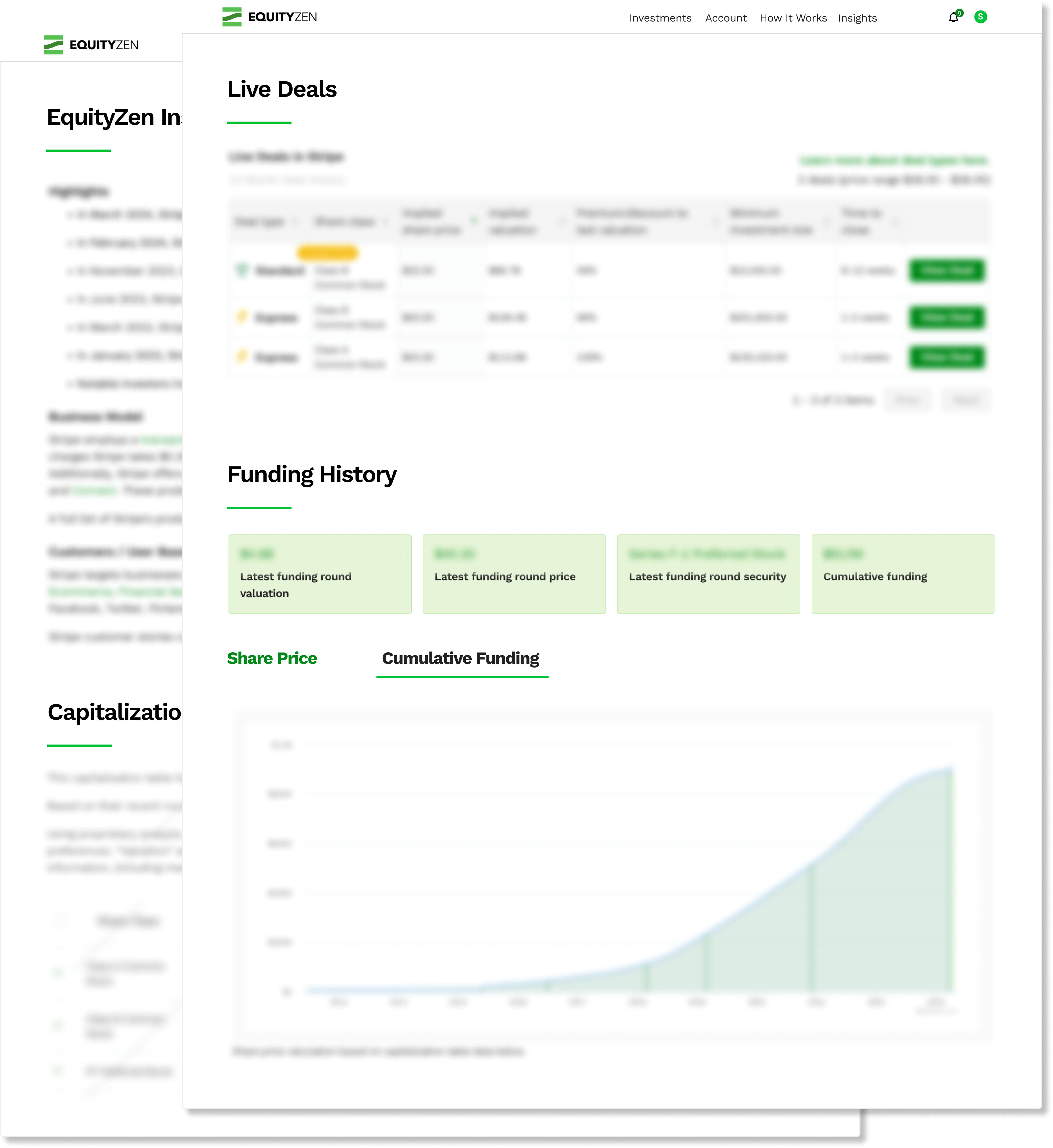Sign Up Today and Learn More About Lightmatter Stock
Invest in or calculate the value of your shares in Lightmatter or other pre-IPO companies through EquityZen's platform.

Lightmatter Stock (LIG)
Lightmatter provides a full stack of photonics-enabled hardware and software solutions that the company claims help reduce power consumption and increase performance.
Lightmatter is a photonic computing company that develops 3D-stacked photonic chips.
About Lightmatter Stock
Founded
2017
Headquarters
Mountain View, CA, US
Total Funding
867M
Industries
Hardware, Software, Data and Analytics
Lightmatter is a photonic computing company that develops methods for computer chips to communicate and perform calculations using silicon photonics. Lightmatter claims that its proprietary technology enables its photonics chips to move data, increasing AI cluster bandwidth and performance while reducing power consumption.
Lightmatter Press Mentions
Stay in the know about the latest news on Lightmatter
Light-Based Computing Revolution: How Optical Transistors Could Render Silicon Obsolete
webpronews • Jan 31, 2026
Data center buildout spurs new laser development
semafor • Jan 30, 2026
Lightmatter Introduces Guide Light Engine for AI with VLSP Technology
insidehpc • Jan 30, 2026
Lightmatter and Cadence Collaborate to Accelerate Optical Interconnect for AI Infrastructure
businesswire • Jan 28, 2026
Lightmatter and GUC Partner to Produce Co-Packaged Optics (CPO) Solutions for AI Hyperscalers
morningstar • Jan 27, 2026
Lightmatter Management
Leadership team at Lightmatter
Founder & CEO
Nicholas Harris
Chief Financial Officer
Simona Jankowski

Join now and verify your accreditation status to gain access to:
- Lightmatter Current Valuation
- Lightmatter Stock Price
- Lightmatter Management
- Available deals in Lightmatter and all other companies with relevant Deal Offering documents
- EquityZen's proprietary data and insights, which may include
- Lightmatter Cap Table and Funding History by Share Class and Liquidity Preferences
- Lightmatter Revenue and Financials
- Lightmatter Highlights
- Lightmatter Business Model
- Lightmatter Risk Factors
- Lightmatter Research Report from SACRA Research
Lightmatter Key Facts
- Investor Interest & Current Valuation: Lightmatter has demonstrated investor interest, securing a significant $400 million Series D funding round in October 2024. This capital raise, which included T. Rowe Price and Fidelity, nearly quadrupled its valuation to $4.4 billion from $1.2 billion in December 2023. The influx of capital provides the company with the resources to scale manufacturing and deployment of its photonic chips, reinforcing its position as a leading innovator in the high-performance computing and AI infrastructure space.
- Strategic Partnerships and Ecosystem Leadership: The company has cemented its strategic importance through key partnerships with industry leaders. In November 2024, Lightmatter partnered with Amkor Technology and Advanced Semiconductor Engineering (ASE) to develop the "world's largest 3D-packaged chip complex" using its Passage platform. This collaboration is crucial for the company's go-to-market strategy, as it ensures Lightmatter's technology can be integrated into high-volume manufacturing processes. Furthermore, joining the UALink™ Consortium in December 2024 positions Lightmatter at the forefront of defining next-generation AI interconnect standards alongside major players.
- Technological Breakthroughs and Product Innovation: Lightmatter continues to push the boundaries of its core technology. The company announced the achievement of a "world-first 16-wavelength bidirectional link on single-mode optical fiber" in August 2025, which represents a major leap in bidirectional fiber bandwidth density. This breakthrough, along with the launch of its Passage L200 and M1000 platforms in March 2025, showcases Lightmatter's ability to deliver on its promise of high-bandwidth, energy-efficient solutions for AI data centers, directly addressing the critical power and performance bottlenecks of traditional electronic systems.
- Intense Competition and Market Consolidation: Lightmatter operates in a highly competitive and evolving landscape. It faces direct competition from other photonic computing startups like Luminous Computing, Celestial AI, and the newly funded Arago. The company also competes against traditional, established semiconductor giants like NVIDIA and Intel, which have vast resources, entrenched customer relationships, and mature software ecosystems. The long-term risk is that larger, more diversified companies could acquire or out-develop smaller players like Lightmatter, potentially commoditizing or marginalizing its technology.
- Technological and Manufacturing Hurdles: While photonic computing promises significant advantages in power and speed, the technology is still in its early stages of commercialization. The World Economic Forum notes that key hurdles remain, including scalability, signal loss, and the inability to store memory optically. Lightmatter's success hinges on its ability to overcome these complex engineering challenges and transition from promising technology to mass-produced, reliable hardware. Failure to do so could lead to a loss of market confidence and make it difficult to compete with proven electronic architectures.
- High Capital Requirements and Investor Dependency: Despite a high valuation and significant funding rounds, Lightmatter is a "deep tech" hardware company, which is an inherently capital-intensive business model. Building and scaling the necessary manufacturing and data center infrastructure requires a continuous influx of capital. The company's recent valuation is in part predicated on securing large-scale commercial deals. A slowdown in securing these critical partnerships or a downturn in investor sentiment could put significant pressure on its financial runway and operational performance. This makes the company's growth highly dependent on market cycles and investor appetites for high-risk, high-reward ventures.
Trading Lightmatter Stock
How to invest in Lightmatter stock?
Accredited investors can buy pre-IPO stock in companies like Lightmatter through EquityZen funds. These investments are made available by existing Lightmatter shareholders who sell their shares on our platform. Typically, these are early employees who need to fund a life event – house, education, etc. Accredited investors are then offered the opportunity to invest in this stock through a fund, like those used by hedge funds serving large investors. While not without risk, investing in private companies can help investors reach goals of portfolio diversification, access to potential growth and high potential return. Learn more about our Guided Investment process here.
How to sell Lightmatter stock?
Shareholders can sell their Lightmatter stock through EquityZen's private company marketplace. EquityZen's network includes over 420K accredited investors interested in buying private company stock. Learn more about the easy and guided Shareholder process here.
If I invest, how do I exit my investment?
There are two ways to exit your private company investment on EquityZen's marketplace. The first is if the company has an exit event like an IPO, merger or acquisition. In that case, we will distribute the shares and/or cash to you directly. The second way is through an Express Deal on EquityZen, if eligible. An Express Deal allows you to sell your allocation of private shares in a given private company to another investor on EquityZen's marketplace. More information on Express Deals can be found here and exit information can be found here.
Why choose EquityZen?
Since 2013, the EquityZen marketplace has made it easy to buy and sell shares in private companies. EquityZen brings together investors and shareholders, providing liquidity to early shareholders and private market access to accredited investors. With low investment minimums through our funds and with more than 51K private placements completed across 450+ companies, EquityZen leads the way in delivering "Private Markets for the Public."





